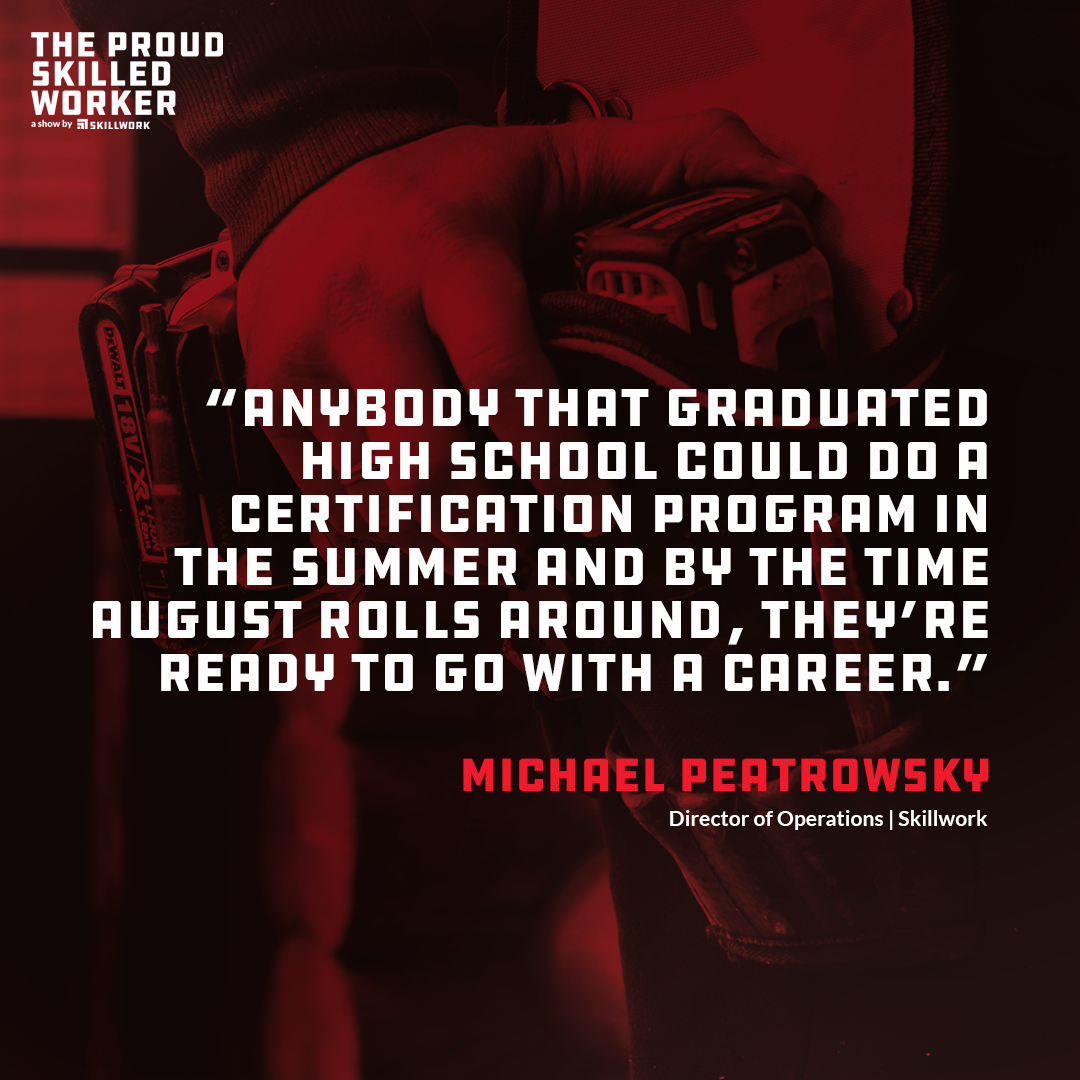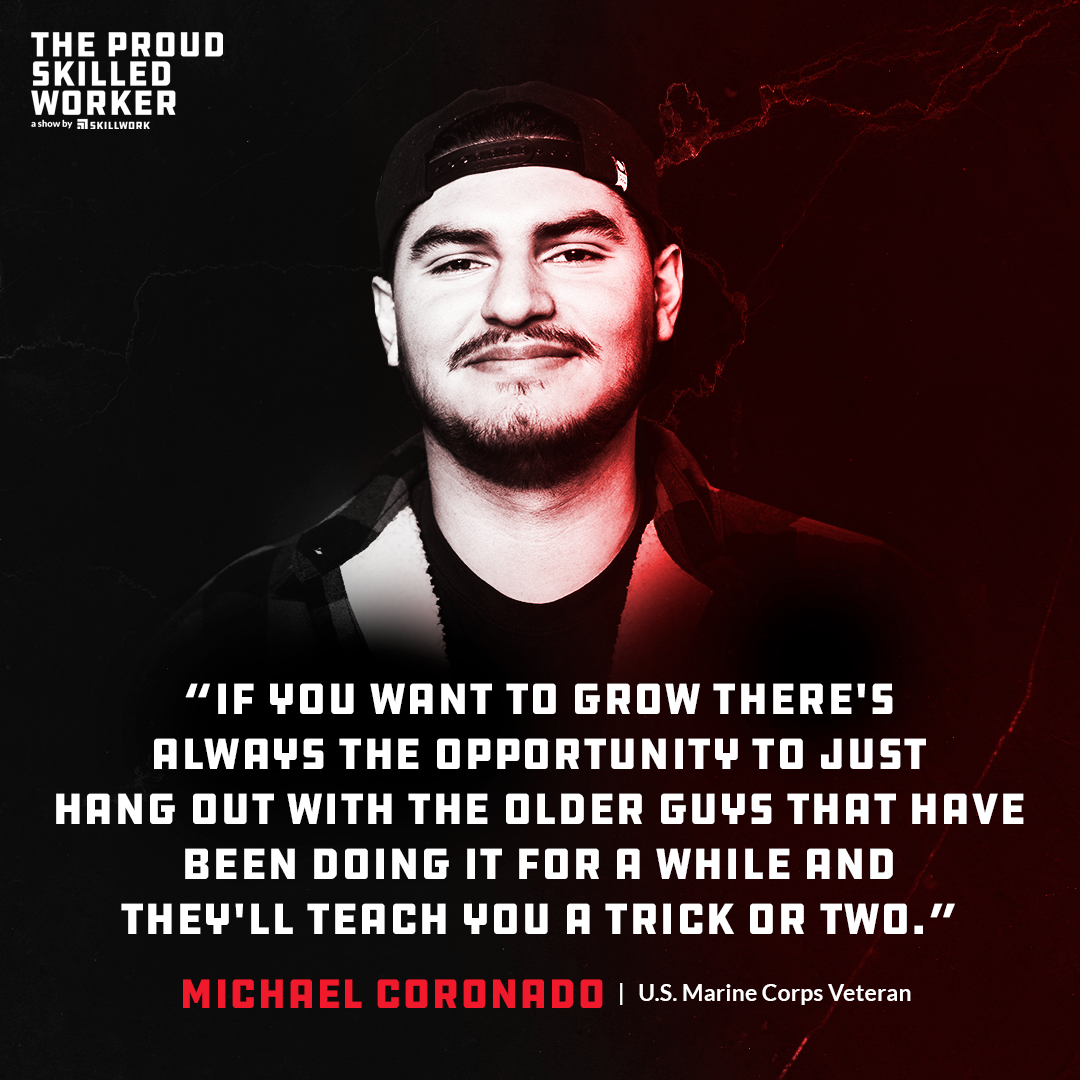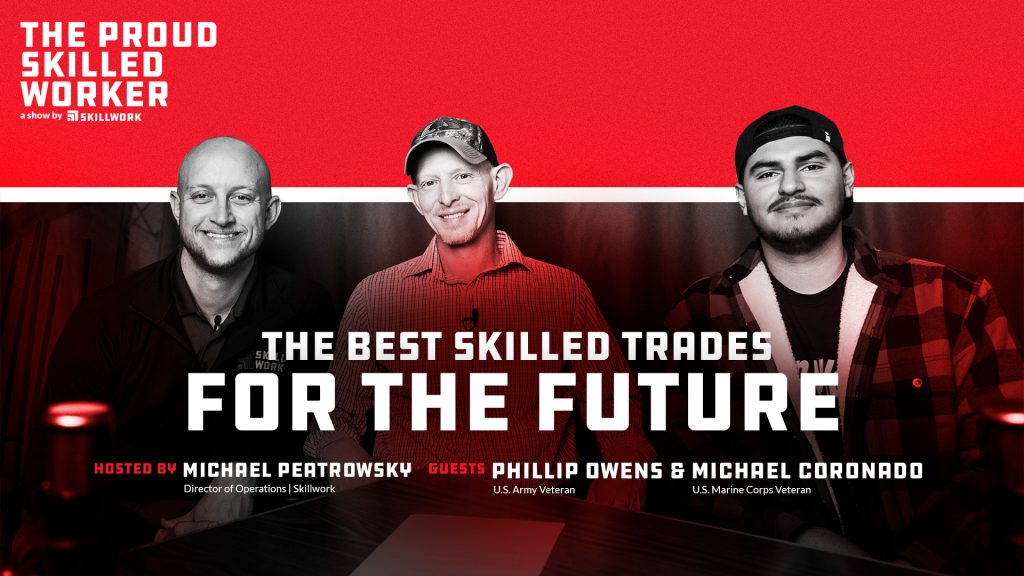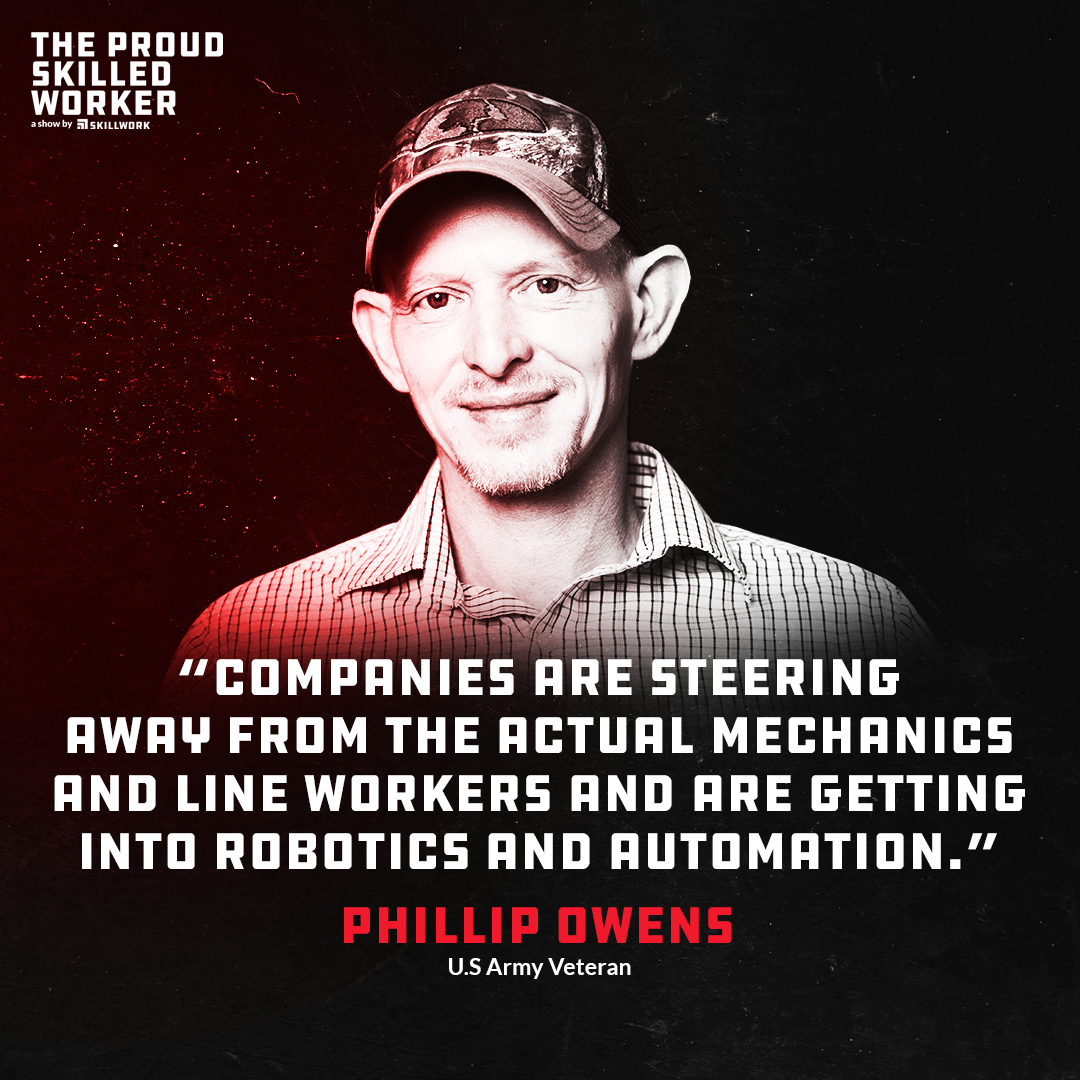- Skillwork’s website: www.skillwork.com
- Skillwork’s LinkedIn: www.linkedin.com/company/skillwork
- Skillwork’s YouTube channel: www.youtube.com/channel/UCWZSf9KTuKudIm2buVFrhcw
- Rveal’s website: rveal.media
- Rveal’s LinkedIn: https://www.linkedin.com/company/rvealmedia/
- Rveal’s YouTube channel: https://www.youtube.com/channel/UC69p14R2ccMdyUbbmdlWCEw
Full Transcription:
Michael Peatrowsky 00:13
Welcome back to The Proud Skillworker. We have Phillip, United States Army veteran, Michael, United States Marine Corps veteran. What we’re going to talk about right now is best jobs for the future. What are the trades that you need to be getting into? So, what’s coming guys? What do you guys feel like in the world of maintenance certifications development? What do you guys think is is actually coming? Like, what’s the next thing?
Phillip Owens 00:34
In my field, in the industrial maintenance, I think it’s more of, it’s gonna be more of not so much hands on but robotics, you know? Either they’re steering away from the actual mechanics, and the actual line workers and are getting into more the the robotics and the, you know, autumn is automation. I think, if anybody comes into the field that I am, I think they need to have the more hands on to learn these different trades, because everything’s coming to technology. And that’s just gonna be the world from now on.
Michael Peatrowsky 01:03
Do you think that’s, that’s like more PLC computer interface stuff? Or like, yeah, when you say, like, coming into trades, because, for me, I see like, “Hey, you might know how to fix it but you also got to know how to step back and really interface with the project and program it.” So is that I mean, is that a skill you’re going to need to have is being able to interface and program and at least understand what the machine is doing as it’s being automated?
Phillip Owens 01:28
Yes. And that’s what the the mechanics that I work with, that’s one of the things that I tell them I say, “you need to look deeper into just what’s broke”, you know? You have to find out what’s causing it to break, you know? You can always look at the PLCs on a piece of equipment, you know, and see, “Hey, that lights on, but it’s not supposed to be on so that means that the sensors bad”, or you know, “that light supposed to be on but that lights not on so this must be bad.” You know, and I tell him that and that’s, I didn’t go I didn’t go to school for that. And that’s just something I learned over time, you know? I had a I had a boss of mine to sit there and he did the same thing with me says, “Hey, look at that board right there. Tell me what’s wrong with that”. And I’m like, “a bunch of blinking lights, I don’t mean nothing to me”. And he goes, “well that means everything to you, you better learn.”
Michael Peatrowsky 02:12
Those lights, those lights are your job, let’s learn them. That’s funny.
Phillip Owens 02:15
That’s what it was. So that’s what I tell the mechanics that I work with, you know? You want the easiest way, the best way to do your job is to look at those blinking lights. Rights. It’s gonna tell you everything
Michael Peatrowsky 02:24
What about Michael, for you, I mean, in automotive world. How is how is technology or is advancements and certifications? Like what’s what’s next for you?
Michael Coronado 02:33
I want to get into electrical electrical, okay. Because I mean, I know how to read schematics and work on electrical, I built my own wiring harness in my 69 nova that I have. Everything is going to the electrical side, like he was saying. And yes, it’s helpful to be hands on mechanic, replacing alternator pumps, installing hydraulics, cameras, stuff like that. But all that stuff is being built in to other components now, and it’s not really needing maintenance. And if it does, you just replaced the whole thing and the whole unit as one.
Michael Peatrowsky 03:03
Cars run on computers now. Yeah, there’s no maintenance left now. Yeah, you got to have a computer to do that.
Michael Coronado 03:09
To scan her to see what’s wrong with the code, I mean, you can’t just look at it by looking at the light, you have to dig into it deeper. And I think the electrical side is where it’s all going. So I’m gonna have to start looking into that now.
Michael Peatrowsky 03:21
Okay, what’s out there for that? I mean, courses, I think there’s some ASE certifications that go into that is there is there other things?
Michael Coronado 03:28
There’s some like journeymen programs you can do. If you have the opportunity to there’s just hanging out with the older guys that have been doing it for a while, they’ll tell you a trick or two.

Michael Peatrowsky 03:35
Yeah, definitely teach a new dog new tricks. So for me, what I want to understand is, is both of you guys are currently in really strong fields, strong fields that are definitely like depleted in talent. Nobody’s really coming up to reinforce you guys at this point in time. What do you guys what are you guys looking for? When you guys want to bring somebody in? Like when you’re talking to people who you want to come work for you, like, what are you telling them? Like, “Hey, man, go get this job. It’s gonna probably be uncomfortable for the first year or two. But we’ll get you trained. We’ll get you into these certs”. How do you guys sell what you do to people? Like what is the what’s the drawing force that you’re using?
Michael Coronado 04:13
I look for someone being organized. Or it for me, I’m very brutal, brutal with how I want to, if I want to work with somebody. Yeah, I got to see how they talk. If they talk clean, if they talk smooth, not me, not smooth, but if they talk not all trashy, I can work with them good. Or if they’re just if they get in the car, and it’s all trash. I mean, that just shows me their work ethic, I’m not really “Oh, this guy’s gonna keep the shop clean and you know, work good.” But they have to be willing to learn, willing to take criticism and not be like, “Well, I did it this way and it worked all the time”. It doesn’t work that time all the way. You got to do this way, cut this one, cut this, whatever. But just have the right attitude. And somebody that I could be you know what you’re messing up, I’m going to have to write you up. Not someone that I’m going to be afraid to oh and just let it slide maybe we’ll fix it next time. Somebody that you can you’re you’re able to not beat down but you’re able to criticize them in front of people, so they know. And then, so there’s no like friends a friend relationship in the job, you’re all co workers. You can have friendships, but just not to where it risks the jobs, worksite integrity.
Michael Peatrowsky 05:23
Yeah, I mean, sometimes working with your buddy’s harder, because you got to look at him and go, “Hey, you didn’t do that right.” Yeah, like, “Hey, we’re gonna be friends, I get it, but you’re doing this wrong and it’s not it’s not helping anybody”. So that’s an interesting dynamic. I’ve never really thought through like that world of, hey, we’re all friends. But at the end of the day, you’re wrong. You just you got to fix it. So
Michael Coronado 05:43
Yeah starts conflict.
Michael Peatrowsky 05:44
Yeah it does. And if you can’t handle that, that’s a different that’s a different and there’s, there’s something outside a job you got to deal with. The other is, Philip, what about for yourself? I mean, what do you, when you’re bringing people in, and you’re like, “hey, I want you to be a part of my team, but here’s what I need you to learn first”. What is that? What’s that first thing you tell people? If you were taking someone who had no experience, no apprentice programs, nothing, just walked in, “hey, I need a job.”
Phillip Owens 06:06
I’d probably go with their ambition and their attitude. Okay. I’ve seen a lot of mechanics that come through that didn’t even know how to run a wrench besides, you know, even how to work a grease gun. And but if you have somebody that’s willing to do anything to learn that job, because they enjoy what they’re doing, or they have a great attitude, you know? They’re always like, “hey, what do you got for me to do right now? What do you have this”, you know? That’s, that’s it. You can take anybody and you can make them the best they could ever be. But they have to start with that attitude they have. And I’ve seen mechanics, that’s been in doing this job for 25 years that just have a bad attitude. Nobody wants to work with and nobody wants to be around them. Nobody, you know what? You want to go home, just go home, because I really don’t want to hear it today.
Michael Peatrowsky 06:47
That’s tough. And it’s, I’ll do the work myself instead of hearing them complain.
Phillip Owens 06:51
I don’t want to work with somebody, like I sit there and listen to him constantly complain, you know? I’d rather take that new guy over there, don’t know how to run a grease gun, then have your experience on my back. Right? You know, and that’s just the way it is, I’d rather show him than listen to you.
Michael Peatrowsky 07:03
I know, I get that. I think, for me, what I want to know, and so, like professionally developing and kind of growing in your role to uptick those is important. So like, what certification and training should companies be sending people to? Is, is the the biggest frustration that we hear from skilled workers, who were actually in the field is “I want to learn more, but nobody’s giving me an opportunity. But they want me to know more”. It’s, it’s that old joke of need five years of experience. I’m 21. Where do I get that at? Like, this idea that people are going to have more experience than they have years on the earth. So what certification and training programs do you guys think companies should be investing in, in sending people through? Or that you guys would invest in yourselves and send yourself to?

Phillip Owens 07:49
The company that I work for is into the in the food industry, You know, they’re in the food business. Most of them that I’ve worked for have been that way, but you know, it’s it’s different equipment. When I was in Texas, you know, it was all different equipment from what I’m doing, using up here. Yeah. I think these companies have focused on giving their mechanics, the classes that they need to know all about this equipment.
Michael Peatrowsky 08:12
Oh, interesting. Like an on site training? Like, “Hey, welcome, like, we’re going through an on site training today.”
Phillip Owens 08:17
The company that I work for now. Yeah, there, they are all about that. I could walk into their office right now and say, “Hey, can you send me to Kansas City for multivac training?” Oh, wow. And they’d say, “yeah, you want to leave tomorrow?” You know, and that’s the stuff that they do because they want their they want their mechanics to know this equipment. Like I said, they pay for sending their apprentice to, you know, to school. You know, but if I walked into that office, and I said, “Hey, you know what, Nick, I’d like to go to computer programming, or you know, PLC programming.” Whatever it is and they go “oh, yeah, I can set you up on so you can start next week if you want.” And they hit they have no they have no Plex about that that they want that skill in their people. When I was in Texas, the company that I worked for, they sent me to a four day ammonia refrigeration certification class because they wanted all their mechanics to be ammonia certified. Okay,
Michael Peatrowsky 09:13
So down in Garden City? Is that where that was? Yeah.
Phillip Owens 09:18
They they spent all this money to send these people to get certified for ammonia refrigeration just to have a contract company take care of all of it. Interesting, you know, so they they took four days of my life to send me to a class that I’m never even gonna use. I mean, I’m glad that I got it of course you know coming free circuit. Yeah. Let’s let’s build a resume even though I never used it. You know, and that whenever they was asked say “hey, we got all this new equipment in here that nobody knows even how to run nobody’s even knows how to power it on. Nobody even knows the password to get into it, you know, to see the settings or whatever it is, and they go, “Well, you better get the book out”. Unlike, so you’re going to send me to four days refrigeration class that I’m never going to use, but you can’t give your mechanics a training on the equipment they’re going to be working with every day. That stuff. And you know, and that’s like, that’s why I’m grateful at with, the company I work for, because they want that, they instill that. “You want this? It’s right there, you can have it.”
Michael Peatrowsky 10:19
Yeah, I bet that, that that attitude that the company you’re with now takes is probably a little a little nerve wracking in today’s environment, because you send somebody to five or six of those training certifications, and they turn around and leave, as we just talked about this world of, well, I don’t like it here, I’m going to go. That starts to become kind of a cost issue. And so it’s great that companies are still and I’m happy to hear that with your company, that companies are still like, “no, we’ll send you. Let’s get you certified”. And it’s not a “Well, you haven’t really been here long enough, you haven’t done the thing.” So it’s good to hear that. And I think companies need to take a better approach at leveling up and and kind of growing their own employees. Because like you said, I’m glad I had that cert, but I wish I would have used it like if they would have asked me to use that certification. Hey, you got me certified? Let me use it. Oh, okay. But you want me to work on this thing? That I don’t know anything about that you won’t certify me in? And how does that make sense? So companies understanding that, asking people to do things, there should be a why behind it? Or at least explain it instead of “just go do this and have a good day, we’ll see you later”. So I think that’s tough. I think for you, Michael is probably different in the automotive industry isn’t it? I mean, just in on that side of the house, there’s a lot more certifications and steps that come with that. So curious to know kind of for you what’s that look like?
Michael Coronado 11:36
For me I work on semi trucks, and I install hydraulic systems. I just dress them up all the way all the way down. No, not like that. Not yet. Yeah, we work with a lot of electricity with them, we, we tear apart some of the wiring harnesses and tap into them and install our own harnesses in there. So I think, anything to do with the electrical side, like low voltage, it just makes you have an understanding. Some people are afraid to touch their batteries, I’m like dude. When they swap them out. Like it’s not going to hurt you, just go at it, it’s not, you’re not gonna, if unless you touch something else then you’re fried. You’re not getting anything else. Just don’t be afraid of it, then they’ll get a better understanding and they won’t be so scared. Like, low voltage helps me with the job that I got. And I’m gonna have certified hydraulics too. But uh, I had a good understanding of all that in the military. I don’t have much civilian life experience yet. But I could say from with my current situation, it was hydraulics, low voltage, and just having a over overall knowledge of how something works. Yeah. And if you don’t know how it works, you look into it and figure out how it works.
Michael Peatrowsky 12:42
You talked about that, that low voltage certification and that that height, that height certified that big, giant windmill certification you got you’ll never use again, because you don’t like it. How long did that take you? What was that course like?
Michael Coronado 12:54
Oh, that course was not long at all. It was only like, was it two and a half months?
Michael Peatrowsky 12:59
Okay. So in two and a half months, you got a certification that is now going to work for you for the rest of your life on that low voltage wiring. And then four days, Philip, you got a certification and you said it was ammonia refrigeration through Garden City? Yes, that’s good for it’s five years, right on that? Two years, two years. Okay. So you guys just describe two certifications that take less than 60 days or right at 60 days that have a career path behind them. And so that’s what I’m curious of is why are more people not investing in for four days and then I have a job? I got four days.
Michael Coronado 13:36
It’s not like a two hour class a day. I was in, in class, almost like a nine hour shift each each day for that whole two months. So if someone’s working. Yeah. I was eight to 4:30. That was my, I had a lunch in between too so it was a long class. And it was a zoom during the beginning of pandemic I think it was. And then after that I went hands on I climbed the tower,


